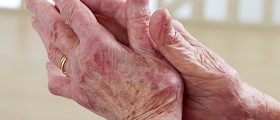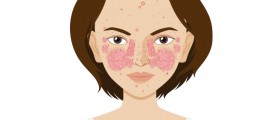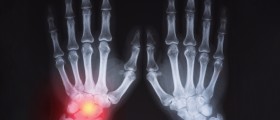
Joint swelling
Swelling of the joints (or joint enlargement) usually affects the hands, feet, and ankles. Patients complain about the stiffness and redness of the joints, and report even severe pain. It could worsen when a person is standing or walking, and might sometimes cause complete immobility of the patient.
The most common cause of the joint swelling is the inflammation of the joints (known as arthritis). Also, joint infections and injuries might lead to the pain and swelling.
Rheumatoid Arthritis
This is an autoimmune disorder, caused when the immune system of a patient attacks the healthy tissue. It is often find in women, 25 to 55 years old. Exact causes of this illness are unknown. It is suspected that genetic predispositions, hormones and infections might have been associated with the disorder.
Patients experience the worst pain when getting up from the bed and the attack may last for a couple of weeks. Some people have other symptoms, like fever, loss of appetite, red and inflamed skin and numbness. Patients might also have different eye problems and anemia.
It usually affects the hands and feet joints. Most patients suffering from finger joints swelling are suffering from rheumatoid arthritis.
The condition must be treated, and it normally lasts for patients’lifetime.
Osteoarthritis
Aging affects the joints and wear them off, so arthritis is very common illness in the older patients. This form is arthritis affect the cartilage of the bone and is known as osteoarthritis.
Joint Infections
Septic arthritis is a bacterial inflammation of the joint, leading to swollen joints. The untreated condition might provoke structural change or complete destruction of the joints, and that’s why this condition must be taken care of.
Joint Injuries
An accident or the trauma, such as broken bone, might cause joint swelling. A wound on the outside, on the skin, may enter inside and inflame the joints. Anything more serious than a minor injury of the joint, that lasts for more than one week or causes redness, chills or a fever should be reported to your doctor.
Your knee joints are prone to joint injuries. Keep them protected during the sports activities, to avoid any potential joint problem you mighthave.
Treatment
Usually, the therapy depends on the condition of the patient. Arthritis cases are most likely to be treated with painkillers and sometimes corticosteroids. Corticosteroid drugs (such as Prednisone) are prescription medications, used to prevent any further damage to the joints and ease the pain.











-Symptoms,-Diagnosis,-Treatment_f_280x120.jpg)





Your thoughts on this
Loading...